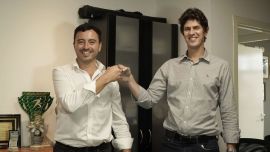A panel of international human rights experts selected by the Organisation of American States (OAS) released an unprecedented report this week accusing Venezuelan President Nicolás Maduro’s administration of committing crimes against humanity.
The three-member panel, which included Buenos Aires Province Human Rights Secretary Santiago Canton, has recommended their findings be submitted to the International Criminal Court (ICC) with a view to prosecution.
The 400-page document features accounts of arbitrary detentions, torture, and extrajudicial executions. It is the most complete report to date detailing human rights violations by the Maduro administration in the country.
“The panel has determined that there are clear cases of political persecution in all the crimes against humanity presented in our report, said Canton, speaking at a press conference at OAS headquarters in Washington on Tuesday. “The deprivation of the victims’ fundamental rights form part of a general and systemic attack [by the government.]”
This is not the first time that Canton has faced off with the Bolivarian government in Caracas. During his tenure as executive secretary of the Inter-American Commission of Human Rights (IACHR), Hugo Chavez’s government demanded the Argentine official’s resignation after Canton criticised the Venezuelan leader’s treatment of the media and control of the Judiciary.
However, this time out, with growing international pressure against the Maduro administration and new rounds of sanctions announced this week by the United States, the European Union and Canada, the report could make a significant effect.
In a telephone interview from Washington, Canton detailed the seriousness of the new allegations to the Times.
Why did (OAS SecretaryGeneral) Luis Almagro ask you to be a part of the panel of experts?
Luis Almagro chose the committee in September. There are three experts: the former Justice Minister for Canadian prime minister Pierre Trudeau Irwin Cotler; Manuel Ventura Robles, who is the vice-president of the Inter-American Court of Human Rights, and who represents Central America; and me. I represent the South American region. In my case, it was for my work on human rights in the Inter-American system.
Why exactly has the panel recommended that the report against the Venezuelan government be submitted to the International Criminal Court?
You need to show that there are a reasonable grounds to have the ICC involved at this early stage. It’s the lowest standard of evidence required by the ICC.
Crimes against humanity are technically defined in Article 7 of the Rome Statute as “specific crimes committed as part of a widespread or systematic attack directed against any civilian population, with knowledge of the attack.”
So we investigated the evidence, holding hearings and analyzing information from the United Nations, other international and local human rights organisations, and we concluded that there exists reasonable evidence of an ongoing and systematic attack against the civilian population, and that the ICC should continue the investigation and open a case. That would be the process.
What are the crimes against humanity committed by Maduro’s administration?
There are several crimes. There is a list of 8,200 cases of extrajudicial executions. The former chief prosecutor of Venezuela Luisa Ortega provided this information – this comes directly from an official of the Venezuelan government that is now in exile.
It was cases of social control. The government tried to control the society through killing these people. And we identified 131 cases of murder victims during protests. Then you have 12,000 cases of arbitrary detentions and approximately 300 cases of torture and 200 cases of sexual violence toward men and women – including rape and electrical shocks to the genitals.
The Venezuelan government takes advantage of this humanitarian crisis by providing medical assistance, food and other needs to people that are politically allied to the government or show their vocal support.
There are also a few cases of forced-disappearances but not too many.
This deserves to get the attention of the international community and the International Criminal Court.
Is there a real possibility that Maduro and his Cabinet could eventually end up in jail?
Absolutely, the head of the administration could be arrested based on the ICC’s decision.
Are the majority of the 12,000 cases of arbitrary detention and imprisonment political?
Everything is political persecution. All the human rights violations are based on political persecution.
How was this evidence gathered precisely?
The secretary of the OAS requested that Venezuelan and international NGOs provide information, and we collected, analyzed it and held hearings in Washington DC to discuss it. Now if you ask me if all the information can be proven 100 percent, I would have to say no. There is reasonable ground to believe it is all correct but it can’t be proven 100 percent.
Is the creation of this OAS panel outside the normal scope of the commission and the court’s work?
It is entirely out of the ordinary, and it is great that this is being done with these types of issues.
How does this report compare with other cases in Latin America in which ICC prosecutions go forward?
There isn’t a comparison. The ICC has only existed for 20 years. One important aspect of the ICC is that it was formed to be a complementary system. It only operates when the legal resources in a country have been exhausted. Otherwise, the ICC will reject the case. So we also needed to prove that there were no means internally to address and resolve the human rights issue. The judicial system is 100 percent controlled by the government. The only other mechanism that exists in Latin America to address these types of problems is the Inter-American System, the Commission and the Court of Human Rights. Venezuela withdrew from the Inter-American Convention of Human Rights, and they haven’t accepted a visit since 2002.
What do you think will be the effect of this report? Will it lead to harsher sanctions?
I hope the main impact of the report is not just political. I hope that the ICC starts to take it seriously – the sooner, the better. This will send a message to the Maduro administration and members of his Cabinet, that this is serious and that they could go to jail.
Some critics of the Maduro government argue against the use of sanctions against Venezuela saying it will mainly hurt the population and not the government. What is your opinion about that?
That is a very long-standing issue. The human rights community doesn’t like sanctions that always end up affecting the people they are supposed to protect. Economic sanctions will be the last resort. At this point right now, the Maduro administration has proven that they don’t care about its citizenry.
You are the human rights secretary of Buenos Aires, Argentina’s largest province. What are the most severe human rights situations there?
There are several issues, like [in many] other places in the country, but we have 40 percent of the country’s population. There are severe problems with conditions in the penitentiary system. That is something that we recognise and are trying to address and solve. It is a serious issue. We are having problems with femicides, violence against women. It is a big problem, and the government has made it a priority since day one. Those two are at the top of the list. Another big challenge is that we are going to reach the 40th anniversary since the return of democracy in 1983, but the issues regarding memory, truth, and justice concerning the crimes against humanity investigations against the last military dictatorship are moving very slowly and many of the defendants are dying without being prosecuted. Many victims will not get justice because of the amount of time it takes. And the justice system has acted very slowly in addressing this situation. In the province, we are contributing to this by turning clandestine detention centres into memory sites. But there is still a long way to go.
The UN special rapporteur on Torture, Nils Melzer, reported that the conditions prisoners are facing within the country’s penitentiary system amounts to torture. What steps have you taken to improve it?
This is an endemic problem that has existed for decades and that no government has taken it seriously enough to solve it..
We have started to open workshops for the penitentiary system so they can train officials, but we are still working on the main problem which is creating sufficient space.
We are now in the process of building a new prison.
Rights groups criticise how slow crimes against humanity investigations are. What can be done to improve this?
That is up to the Judiciary, the Supreme, federal and provincial courts. They need to address this issue. They need to open up more courtrooms dedicated to crimes against humanity investigations. Since 1983, they have treated these crimes as standard judicial cases ... but this is not an ordinary crime. The Judiciary should address this issue.


























Comments